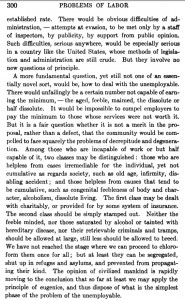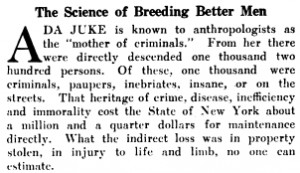Margaret Sanger, “Apostle of Birth Control Sees Cause Gaining Here,” 8 Apr 1923. Source. Which asserts it comes from from the “New York Times, Apr. 8, 1923, XII..” and also says: “This article was reprinted by the American Birth Control League in a flyer with two other newspaper articles as “Real Facts About Birth Control,” …
Category: legislative eugenics
The ‘Minimum Wage’ as a way to make ‘defectives stand out’ for possible eugenic selection, 1913
Henry R. Seager, “The Minimum Wage as Part of a Program for Social Reform.” 1913. [SOURCE] As the enumeration of these benefits suggests, important reform to accompany minimum wage be comprehensive provision for industrial and trade education vocational guidance. Starvation wages are due frequently to exploitation, frequently to physical, mental and moral defects in the …
The Minimum Wage As Means to Exterminate Defectives: Taussig, 1911
SOURCE: Frank Taussig, Principles of Economics, Volume II, 1911. Pages 299-300. As with legislation on hours, factory conditions, and the like, a compulsory minimum wages rate might serve simply to regulate the plane of competition. All employers would be affected alike; no one could undersell the others by cutting below the established rate. There would …
Child Labor Laws as Eugenics Policy
Source: Dr. Frank a Fetter, Cornell University, in a discussion of “Western Civilization and the Birth-Rate”, as found in The American Journal of Sociology, 1907, page 619. The paper mentions but one recent social change which tends definitely and positively to reduce the families of the unskilled classes, namely, child-labor legislation. Such laws as these …
Sterilization Like Vaccination!
The argument that compulsory sterilization was justified on the same grounds as compulsory vaccination was common, and eventually won Supreme Court Sanction in Buck vs. Bell. Source: “Sterilization: A Progressive Measure?” In Wisconsin Magazine of History, Spring of 1960, wisconsin-sterilization-progressives-21585 As Dr. T.W. Williams of Milwaukee wrote, the fate of the present [compulsory sterilization] bill …
Objections to Compulsory Sterilization “are essentially sentimental.”
While eugenics today is castigated as ‘pseudoscience,’ the eugenicists themselves might say that the chief difference between progressives then versus now, is the latter is hindered by ‘sentimentality.’ E.A. Ross, Letter to Charles McCarthy, January 30, 1907. (As found in Rudolph J. Vecoli’s “Sterilization: A Progressive Measure” in Wisconsin Magazine of History, Spring 1960. LINK: wisconsin-sterilization-progressives-21585 …
Scientific American: “The Science of Breeding Better Men” 1911
Editorial from a 1911 edition of Scientific American [Source]: Sci-Am’s Editor’s note: This editorial was written and published in 1911. Although our editors of a century ago pondered some lofty aspirations for the orderly future of humans, it was only three decades later that the brutal reality of a Nazi social order suffused with a …
Davenport: Death is Nature’s Great Blessing to the Race. Why Keep Defectives Alive?
Charles Davenport, in The Eugenic Programme And Progress in its Achievement (1914) [italics in original, bold added] The lowest stratum of society has, on the other hand, neither intelligence nor self-control enough to justify the State to leave its matings in their own hands. On the contrary, the defectives and criminalistic are, so far as …
Separating Sex from Reproduction, the School, and the State
“The family is already being eroded by the intervention of school and state, and [the separation of sex from reproduction] might be its coup de grace.” G. Taylor, 1968
Charity a Hindrance to Natural Selection
In the following foreword from a compilation of 12 eugenic lectures (1914), we see that eugenics is perceived as merely applied evolution. Furthermore, ‘modern man,’ being a sympathetic being, keeps alive those that should die. With luck, principles of breeding already used with animals will be brought to bear on humans. ——————- Foreword by Lewellys …



Recent Comments